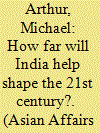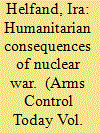|
|
|
Sort Order |
|
|
|
Items / Page
|
|
|
|
|
|
|
| Srl | Item |
| 1 |
ID:
132341


|
|
|
|
|
| Publication |
2014.
|
| Summary/Abstract |
In the wake of the BJP's crushing defeat of Congress in the national elections held in May 2014 the author assesses India's prospects and potential in the light of the oft-made comparison with China. India is famously diverse, the largest democracy in the world, with a relatively young population. India is secular, in the sense that state and religion are not linked, but at the same time India is a deeply spiritual society, diversely religious. In all these areas China's experience is wholly different, but not necessarily better, though in purely economic terms China is far ahead of India and Indian underperformance. Nonetheless, India is likely to be just as central to global issues like climate change, the Digital Revolution, public health and migration. In addition, managing all aspects of the relationship with Pakistan will be one of the key issues for 21st century security. In all this, while poverty, caste and appalling governance will hold India back, diversity, tolerance and an entrepreneurial culture should help her forward.
|
|
|
|
|
|
|
|
|
|
|
|
|
|
|
|
| 2 |
ID:
128059


|
|
|
|
|
| Publication |
2013.
|
| Summary/Abstract |
In March, 130 nations gathered in Oslo for a two-day conference on the humanitarian consequences of nuclear war. The five countries that the nuclear Nonproliferation Treaty (NPT) recognizes as nuclear-weapon states staged a coordinated boycott, arguing that a meeting that discussed what will actually happen if nuclear weapons are used would somehow distract them from the important initiatives they are pursuing to lower the number of nuclear weapons that they possess. Next February, there will be a follow-up conference in Mexico to further delineate the medical effects of nuclear war as they are now understood and to consider the circumstances under which nuclear war might occur. Far from being a distraction, these meetings are helping to create the conditions necessary for the elimination of nuclear weapons. The United States and the four other NPT nuclear-weapon states should participate in the Mexico conference and actively promote the process launched in Oslo to educate policymakers and the general public about the catastrophic humanitarian consequences of nuclear war. This task is particularly urgent in view of the new data that have emerged over the last few years. This information indicates that even a very limited nuclear war, confined to one region of the globe, would have devastating effects worldwide.
|
|
|
|
|
|
|
|
|
|
|
|
|
|
|
|
| 3 |
ID:
153834


|
|
|
|
|
| Summary/Abstract |
Does Narendra Modi bring anything substantively new to Indian foreign policy? This article assesses Modi's record towards Pakistan and China, arguing that he has significantly changed the course of India's diplomacy, at two levels—bilateral diplomacy and coalition diplomacy. India has traditionally followed a policy of slow-to-anger, prudential bilateral diplomacy and, in the name of non-alignment, reluctant coalition-building against both powers. Under Modi, New Delhi has adopted a more assertive stance bilaterally and has actively sought to recruit third parties into a diplomatic coalition against Pakistan and China. Modi's assertive bilateralism has translated into an insistence that anti-terrorism is the only subject of discussion and that the Kashmir dispute with Pakistan is off the table. In the case of Beijing, assertive bilateralism has meant reversing India's traditional stance of normalization of relations leading to a border settlement by arguing that quicker progress on a settlement must be the condition for any further diplomatic normalization. Modi's coalition diplomacy has entailed an active engagement with the US, the Gulf countries and even China against Pakistan, and with the US, Australia, Japan, Vietnam and the Indian Ocean states against China. The objective is not alliance-building but rather the application of diplomatic pressures against India's two rivals. Modi's diplomacy has been marked by a cooperation–defection cycle with both powers, signalling a willingness to cooperate on India's terms and defect when it does not get its way. Not surprisingly, relations with both Pakistan and China have come under considerable strain.
|
|
|
|
|
|
|
|
|
|
|
|
|
|
|
|
|
|
|
|
|